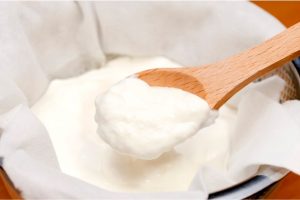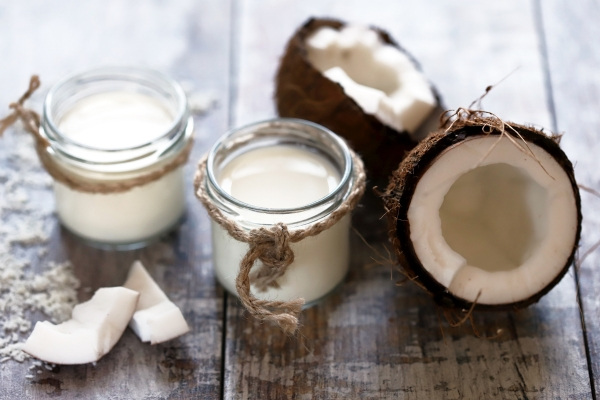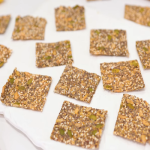I remember the first time I tasted coconut yogurt. It was a revelation. The creamy texture, the subtle sweetness, the hint of coconut – it was like discovering a hidden treasure. Unlike its dairy-based counterpart, coconut yogurt is a plant-based delight, crafted from the goodness of coconuts.
What is Coconut Yogurt?
If you’ve ever stumbled upon coconut yogurt and wondered what makes it so special, you’re not alone. Coconut yogurt is a dairy-free alternative made from the milk of coconuts. It’s created by fermenting coconut milk with live cultures, just like traditional yogurt. The result? A rich, creamy texture that’s both indulgent and satisfying. But there’s more to coconut yogurt than just its delightful taste.
Coconut yogurt has a distinct nutritional profile. Unlike dairy-based yogurts, it’s naturally free from lactose, making it an excellent option for those with lactose intolerance. It’s also packed with medium-chain triglycerides (MCTs), a type of healthy fat that provides a quick source of energy. And for those of us who are mindful of our gut health, coconut yogurt doesn’t disappoint. It’s teeming with probiotics, those friendly bacteria that help keep our digestive system in check.
The taste of coconut yogurt is something to savor. Imagine a subtle hint of coconut wrapped in a creamy, smooth texture that melts in your mouth. It’s perfect on its own, but it also pairs wonderfully with fresh fruit, granola, or even a drizzle of maple syrup.
Coconut Yogurt vs Greek Yogurt
Now, I know what you’re thinking—how does coconut yogurt stack up against the ever-popular Greek yogurt? Let’s dive into the details.
When it comes to nutritional value, both yogurts have their own set of strengths. Greek yogurt is a protein powerhouse, often boasting up to 20 grams of protein per serving, which is fantastic for muscle repair and overall satiety. Coconut yogurt, on the other hand, is lower in protein but shines in other areas. It’s lower in carbs and offers a unique fat profile, rich in MCTs, which can support heart health and provide sustained energy.


The taste and texture comparison is interesting too. Greek yogurt is thick, tangy, and creamy, making it a favorite for those who love a bit of tartness. Coconut yogurt, however, is creamier and milder, with a gentle coconut flavor that adds a tropical twist to your dishes.
For those with allergies or specific dietary restrictions, coconut yogurt might be the better choice. It’s completely dairy-free, making it suitable for vegans and those with lactose intolerance. On the environmental front, coconut yogurt tends to have a smaller carbon footprint compared to dairy-based products, making it a more sustainable option for the eco-conscious eater.
Health Benefits of Coconut Yogurt
Beyond its delicious taste, coconut yogurt boasts several health benefits.
- Gut health: The probiotics in coconut yogurt can help maintain a healthy gut microbiome, supporting digestion and immune function.
- Heart health: The healthy fats in coconut yogurt, particularly medium-chain triglycerides (MCTs), have been linked to improved heart health.
- Weight management: Coconut yogurt can help you feel full and satisfied, potentially aiding in weight management.
While these benefits are promising, it’s essential to remember that coconut yogurt is just one part of a balanced diet.

Two-Ingredient Coconut Yogurt Recipes
Ingredients
- 1 can canned coconut milk preferably Savoy, Aroy-D, or Whole Foods 365 Organic Full Fat Coconut Milk
- 2 capsule probiotic capsules Renew Life 50 Billion or Jarrow 10 Billion recommended
Instructions
- Select Coconut Milk: Choose a high-quality canned coconut milk, preferably one without guar gum for a smoother texture.
- Sterilize Equipment: Wash and sterilize your jar, whisk, and spoon with hot soapy water. Pour boiling water over them and let them dry.
- Prepare the Yogurt Base: Shake the coconut milk can, pour the contents into the sterilized jar, and whisk until smooth.
- Add Probiotics: Open the probiotic capsules and empty the powder into the coconut milk. Stir gently with a wooden or plastic spoon until fully mixed.
- Culture the Yogurt: Cover the jar with cheesecloth and secure it with a rubber band. Let the yogurt sit in a warm place (around 74-75°F) for 24-48 hours until it reaches your desired tanginess.
- Refrigerate: Once the yogurt is ready, cover it with a secure lid and refrigerate for at least 4-6 hours to thicken.
Video
Notes
- Coconut Milk: Avoid using coconut milk from cartons as it’s too watery. Stick to high-fat canned coconut milk for best results.
- Probiotics: Ensure your probiotic capsules do not contain prebiotics, as these can cause mold. Capsules should be fresh and high-quality for optimal results.
- Temperature: If your home is cool, consider placing the yogurt in the oven with the light on to maintain warmth during the culturing process.
- Sterilization: Don’t skip sterilizing your equipment. This step prevents contamination and ensures the yogurt cultures properly.
- Separation: If the yogurt separates, stir it back together or strain it using cheesecloth for a thicker Greek yogurt consistency.
- Shelf Life: The yogurt can last 7-10 days in the fridge. Discard if it develops an off smell or mold.
How to Choose and Store Coconut Yogurt
When it comes to choosing coconut yogurt, there are a few things to keep in mind. Not all coconut yogurts are created equal, so it’s important to read the labels. Look for brands that use simple, clean ingredients without added sugars or artificial thickeners. The best coconut yogurts will have a short ingredient list, typically including coconut milk, live cultures, and maybe a bit of natural sweetener.
Storage is also key. Coconut yogurt is best kept in the refrigerator, and it’s a good idea to consume it within a week or so of opening. If you notice any separation of the liquid, don’t worry—that’s normal. Just give it a good stir, and it’ll be as good as new.
FAQ
As with any new food, you might have a few questions swirling around in your mind about coconut yogurt. Let’s tackle some of the most common ones.
1: Is coconut yogurt suitable for people with nut allergies?
Coconut is technically a fruit, not a nut, so coconut yogurt is generally safe for those with tree nut allergies. However, it’s always important to check the packaging for any cross-contamination warnings if you have severe allergies.
2: Does coconut yogurt contain added sugars?
Some brands of coconut yogurt do add sugar or other sweeteners, so it’s essential to read the label if you’re monitoring your sugar intake. Opt for unsweetened versions if you want to avoid added sugars.
3: Can I make coconut yogurt at home?
Absolutely! Making coconut yogurt at home is a fun and rewarding process. All you need is some coconut milk, a yogurt starter or probiotic capsules, and a little patience. There are plenty of recipes online to guide you through the process.
4: How does coconut yogurt affect blood sugar levels?
Coconut yogurt, particularly the unsweetened variety, is relatively low in carbs, which means it has a lower impact on blood sugar levels compared to some other yogurts. However, as with any food, it’s important to consider portion sizes and overall diet when managing blood sugar.
5: Is coconut yogurt safe for toddlers and children?
Yes, coconut yogurt can be a good dairy-free alternative for children, especially those who are lactose intolerant or have dairy allergies. Just make sure to choose a variety that’s free from added sugars and artificial ingredients.
6: Can I use coconut yogurt in cooking and baking?
Yes, coconut yogurt can be used as a substitute for dairy yogurt in many recipes. It works well in both sweet and savory dishes, adding a creamy texture and a subtle coconut flavor. Just keep in mind that it may change the overall flavor profile slightly.
As I sat down to enjoy my first spoonful of coconut yogurt, I couldn’t help but smile. The creamy texture, the delicate coconut flavor—it was everything I’d hoped for and more. Whether you’re vegan, lactose intolerant, or simply looking to try something new, coconut yogurt offers a delicious and nutritious alternative that’s worth adding to your culinary repertoire.




